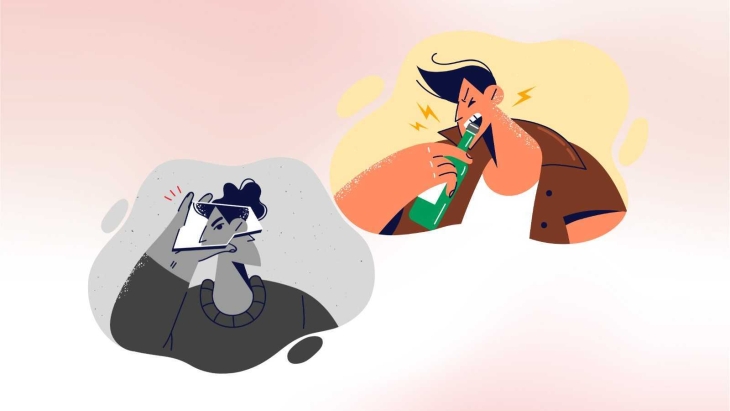Recent Posts
- Am I too sensitive to noise? It drives me crazy! The psychological effects of noise on mental health
- What are the signs that I am avoiding grief? How avoiding processing loss impacts mental health
- My son's disruptive behavior is affecting his life. How can I help him improve?
- I want to be ready for motherhood: Exploring pre- and postnatal mental health issues
- Effects of positivity on job search motivation. How do I stay confident when my job search gets tough?
Most Popular
My husband needs to recover from alcohol dependence and mental health issues. How can I help him?

A romantic relationship that stands the test of time has surely been tested by challenges. Sticking to each other through thick and thin, these couples may have discovered what writer Maya Angelou meant when she said, "Have enough courage to trust love one more time and always one more time.”
One of the challenges that might feel the most difficult for a relationship is when one partner struggles with alcoholism and a mental health issue.
You might feel that things are getting out of your control, you might be overwhelmed, and frustrated about the situation. But you also have a strong resolve to help your partner get through this healed and stronger.
What is alcohol addiction?
Alcohol addiction is not the occasional glass of wine, or drinking with friends on weekends. People who have become addicted to alcohol have lost control of their drinking habits, and despite their drinking leading to negative consequences, they still find it very difficult to stop drinking.
In addition, your partner, in abusing alcohol, is experiencing negative changes in their personality. Once a thoughtful and responsible partner, they have become disinterested in your life together, and have become neglectful of their work, personal responsibilities in the home, and in your relationship.
What’s worse, on the occasion that they are intoxicated with alcohol, they may become aggressive or engage in violent behavior. You also notice them becoming more secretive of their whereabouts, and you find out that they are mishandling their finances due to their drinking habits.
So what can you do if you think your partner is struggling with alcohol abuse?
- Learn what you can on alcohol abuse. Educate yourself on the nature of substance abuse, and the treatment options. This way, you are able to see things from your partner’s perspective, giving you a deeper understanding of what they are struggling with. Also, being educated in treatment options can help guide you in opening up with them the topic of treatment.
- Share your concerns to your partner and offer your help. Before you do so, know that people struggling with alcoholism may act with violence, and may become abusive, so your first priority is increasing your safety, and that of your children and other family members.
It is advisable that you start the conversation calmly in a safe place, and when your partner is sober. Share to your partner the consequences of their behavior on your family and your relationship. Also discuss with them treatment options for recovery.
- Together, decide on an intervention. When your partner receives your help, offer to help them seek alcoholism treatment like counseling, group meetings, and other mental health services to address other mental health issues.
Remember to use positive language and focus on helping one another bring good changes to the situation. For example, by telling them that you are confident that change is possible, and that they have the capacity to do it, you are offering your support.
Make a detailed plan about the interventions you want to explore and assure your partner of your help in every step of the process.
In the US, excessive alcohol consumption is linked to health and safety risks. In addition, loved ones of people with alcohol use disorder (AUD) can experience mental, physical and relational trauma from the consequences of their partner’s AUD.
The good news is that AUD is treatable, and it can be managed by effective programs and treatment, allowing the person with AUD to recover and improve their quality of life.
Remember that you are not the solution that can fix your partner’s AUD, but you can be very helpful in leading them to seek professional help.
Check out the most extensive list of healthcare careers and connect with premier healthcare and mental health opportunities across the US.








Comments